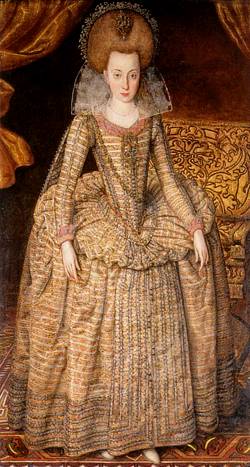Sabbatical Two: That Sassy Jacobean Attitude

When Elizabeth Tudor’s your godmother, bad things can happen to your hair
Elizabeth of Bohemia (1596-1662) was the daughter of James I and Anne of Denmark. She was an immensely beautiful and charming woman whose first appearance at court at the age of twelve caused a huge sensation. At seventeen, she married German Protestant heartthrob Frederick the Elector of Palatine in a love match crowned by the greatest nuptials ever seen – Shakespeare wrote her a play and John Donne an epithalamion. (Her mother Anne of Denmark refused to attend the wedding – she thought the match was beneath her daughter, and referred to the Electress as “Frau Palatine” for the rest of her life). In the fairytale Palatinate capital of Heidelberg, Elizabeth and Frederick designed gardens, threw parties, and made babies until the fatal day that the people of neighboring Bohemia (modern Czechoslovakia) threw out their unctuous and corrupt Catholic overlord Ferdinand II and asked the manly young Palatine to please come and be their king.
Everyone said, “Well, of COURSE you should go and be King and Queen of Bohemia!” So they packed up their burgeoning family (final total : 13 children, of which eight or nine made it to adulthood) and headed for Prague. Ferdinand gnashed his teeth, but the other Catholic Hapsburg princes told him to be patient – the Elector would be a “winter’s king, disappearing with the spring thaws.” It was one of those unhappily apropos epithets that stick – Frederick and Elizabeth were the Winter’s King and Queen from here on out. The Hapsburg armies rolled back into Prague, while the Palatines scrambled out (almost leaving infant Prince Rupert behind in a laundry basket). Not only did Frederick lose Bohemia, but the league of German princes confiscated the Palatinate as well. The “pauper Palatines” were now destitute and homeless.
Notably lacking was any significant help from her father, the King of England, who had felt snubbed that his son-in-law had accepted the Bohemian crown without his official okay. James I provided neither troops nor invited his daughter and her family to return home. While Frederick tried to raise a liberating army among the remaining Protestant princes (who were massively un-keen to antagonize the ascendant Hapsburgs and hemmed and hawed about ponying up real support), Dutch authorities sprinted around madly to find appropriate housing for the exiled young family. Ultimately, they landed in the Hague. They hated it, but lived there for the next twenty years.
Things only got worse from there. Frederick, who at the best of times was moody and easily discouraged, ultimately caught the plague and died in his early thirties. While reeling from that blow, Elizabeth saw her brother Charles executed in England and Cromwell set up as Protector in his place. Her favorite son Rupert was killed fighting for her nephew Charles; another son was kidnapped and murdered by pirates in the Caribbean. Hugely in debt and struggling to reinstate the rights of her children, it is a tribute to Elizabeth’s ability to connect with and charm almost everyone she met, that in Holland, she was universally known as the Queen of Hearts. Eventually the Palatinate was restored to her son, her nephew Charles was asked to return to England to be its King, and Elizabeth was finally free to return home. Charles quite liked his aunt, but had bigger fish to fry and made no particular attempt to welcome her. She died of pneumonia in a house rented for her by Lord Craven, one of the many admirers who spent a fortune in her service. At long last, Elizabeth of Bohemia could rest. Her daughter Sophia, the Electress of Hanover, would be the foundation of the House of Hanover as well as all of the monarchies of Europe -- minus the Albanians (King Zog, forsooth).
